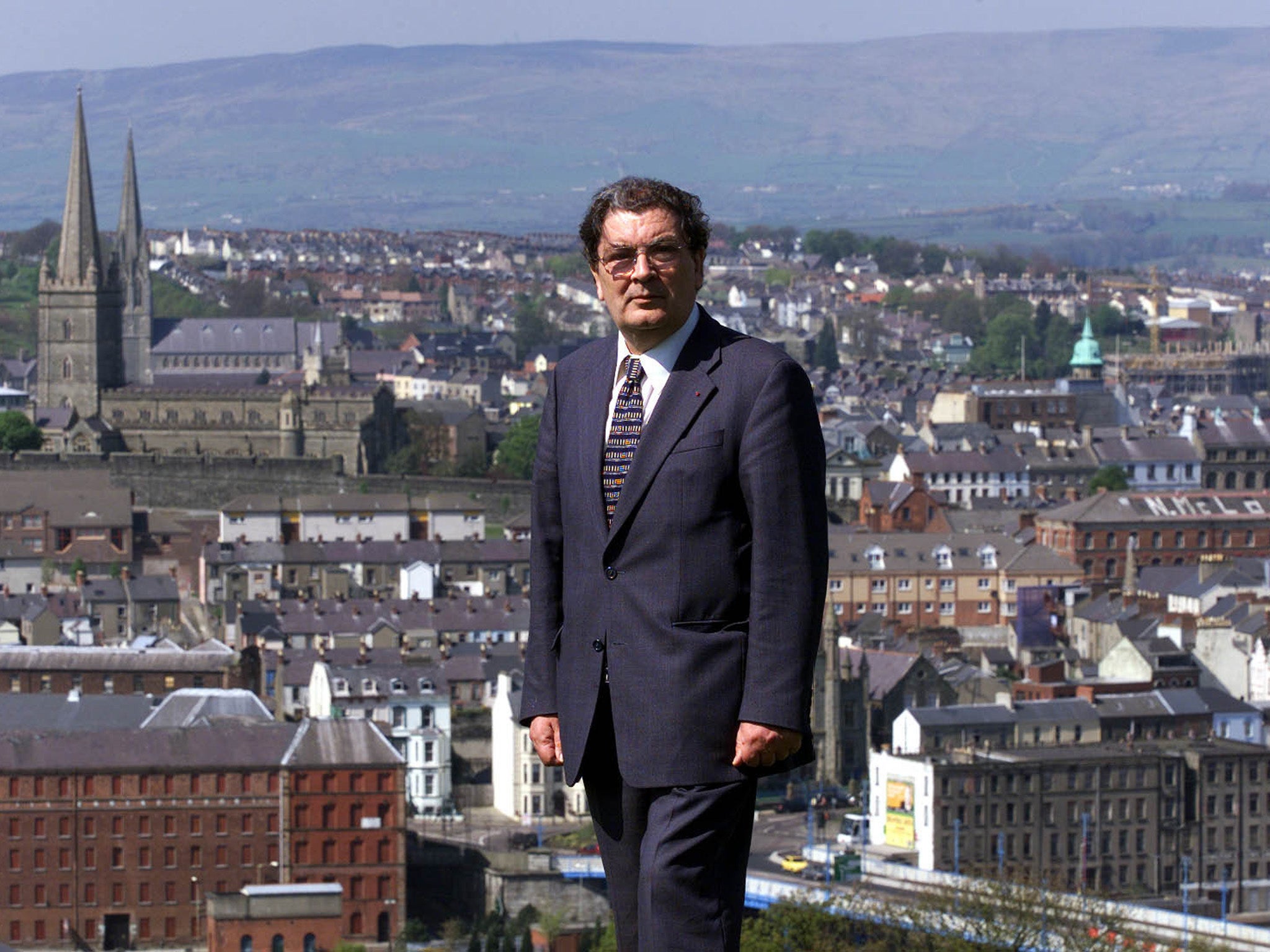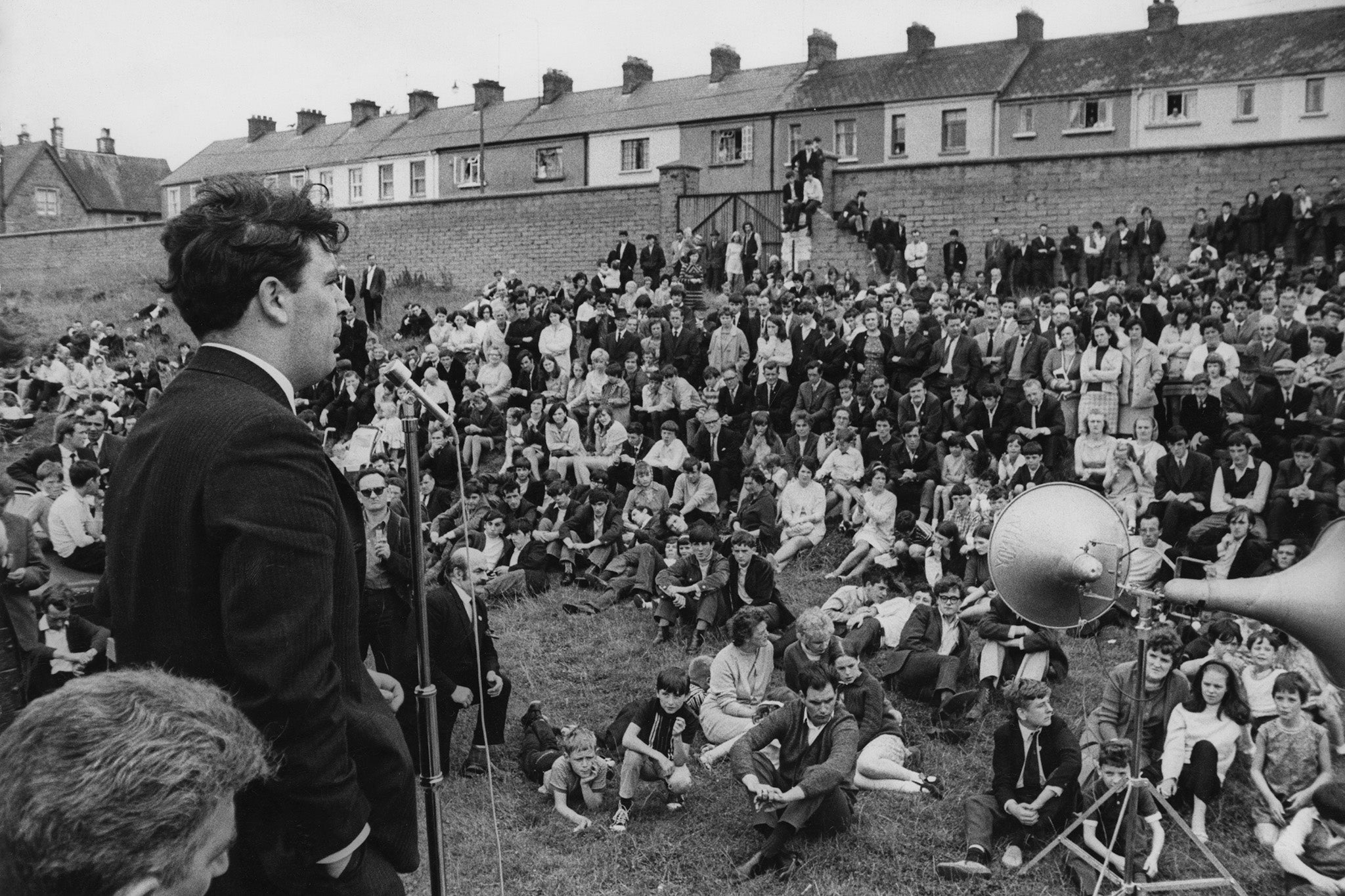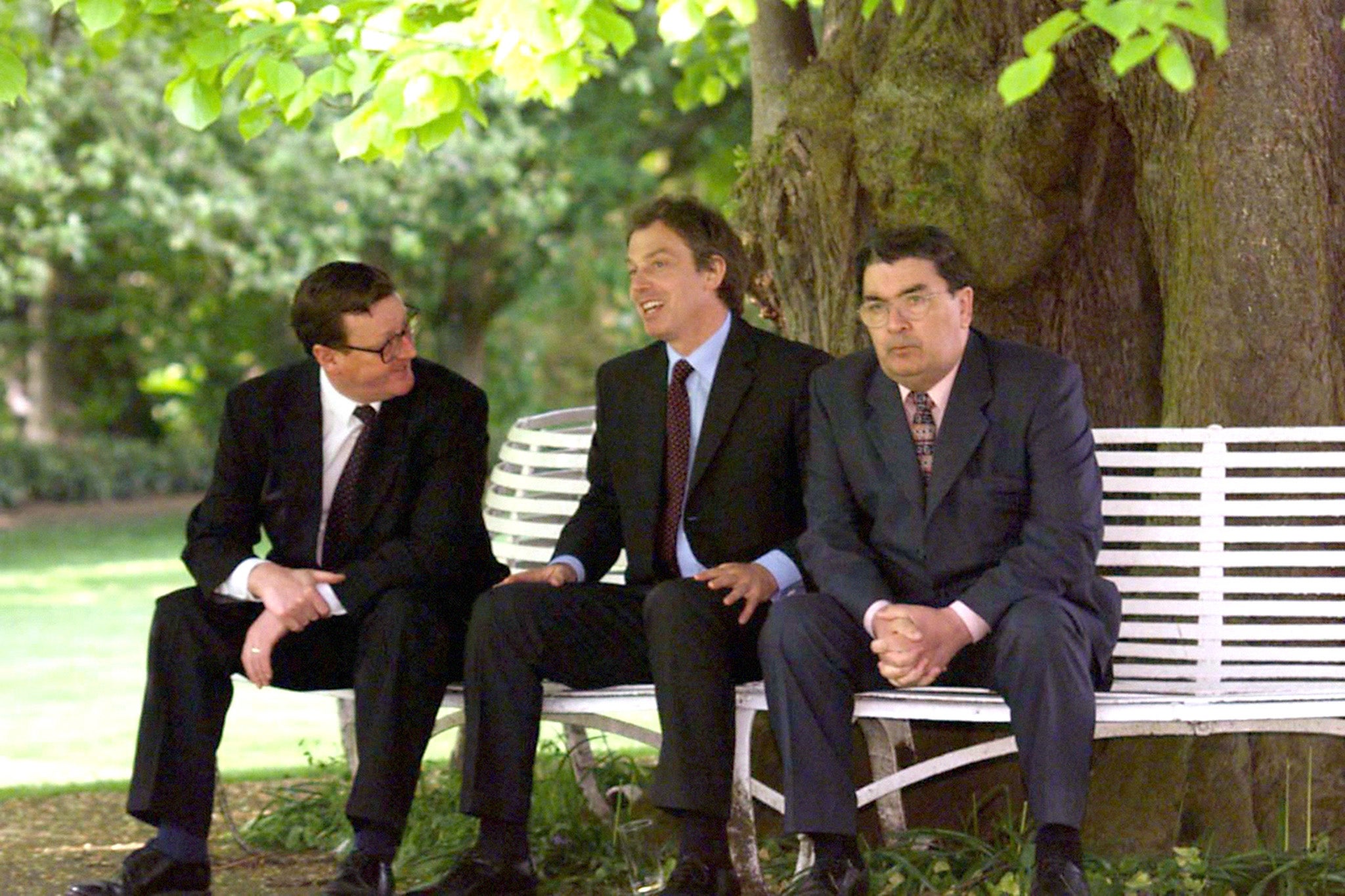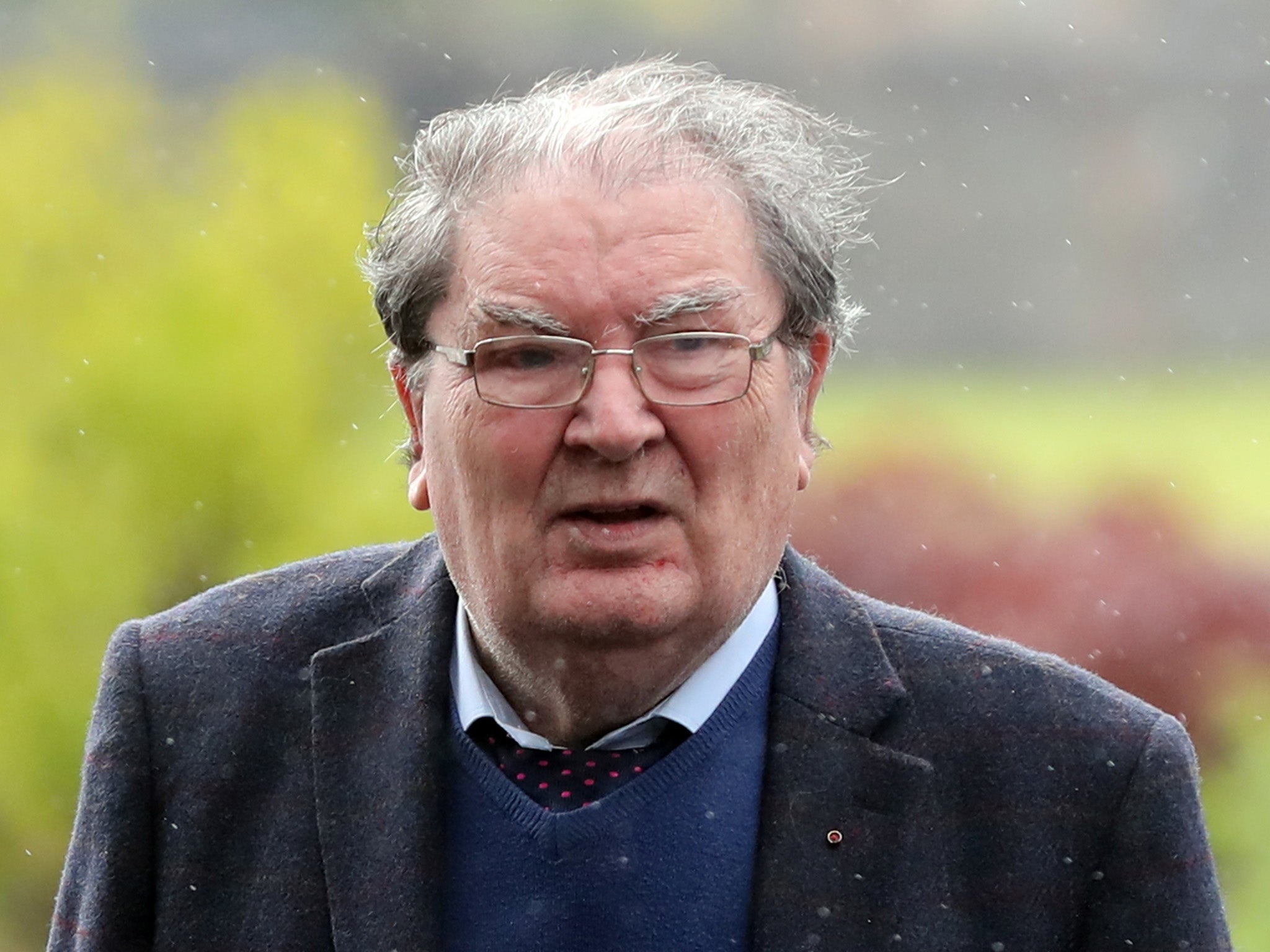John Hume: Principled politician who put peace in Northern Ireland above all else
Like so many, the Derryman took part in the civil rights protests and marches that began in 1968. Despite harassment and death threats from every side, he went on to form a party that eschewed violence and was awarded the Nobel Peace Prize for his crucial role in the Good Friday Agreement

“I never thought in terms of being a leader. I thought very simply in terms of helping people”.
John Hume, who has died at the age of 83, was certainly a leader, and will always be remembered for bringing peace, albeit sometimes flawed and fragile, to Northern Ireland after 30 years of the Troubles. It is a period seemingly, and reassuringly distant today, when terrorism, sectarian murder, indiscriminate bombings, assassinations and kneecappings were the “old normal” on the streets of a part of the UK and the island of Ireland.
But Hume was rather more than a leader. He was more a builder and an architect. He was a sincere and committed constitutional nationalist, a man who believed in a peaceful, political route to the unification of Ireland, to erase the border left after Britain withdrew from the southern 26 counties in 1922. The republicans – IRA and Sinn Fein – preferred violence.
Meantime Hume wished to improve the lot of the Catholic community, long denied their civil liberties, decent housing and economic opportunities by an Orange mini state gerrymandered to keep the unionists in power. Hume, a schoolteacher from Derry began his political career almost accidentally. He’d earlier given up on the priesthood, and in his twenties and early thirties he led the Credit Union movement in Ireland – to offer poorer people basic banking and saving facilities in the days of cash wages and when relatively few had a cheque account.
Like so many, he took part in the civil rights protests and marches that began in 1968, inspired by similar movements in America of which the Black Lives Matter demonstrations are a descendent. Hume was a leading figure on the Derry Citizens’ Action Committee and in the Northern Ireland Civil Rights Association. These were typical grassroots organisations, overwhelmingly Catholic and nationalist, that asked for little more than the kind of rights routinely enjoyed by their fellow Protestant citizens and indeed in the rest of the UK and Ireland. However, they were looked upon as disloyal IRA front organisations by the Stormont regime, and treated accordingly. The turn to violence and near civil war soon followed.

But not for Hume; he refused to move from Derry despite harassment and death threats from every side. Instead, with figures such as Gerry Fitt (the first leader) Paddy Devlin, Seamus Mallon and Austin Currie, he founded the Social Democratic and Labour Party (SDLP), uniting the fragmented nationalists into one group in 1970. The party, led by Fitt, swiftly enjoyed brief success when it entered a power-sharing executive with some unionists in 1974. Hume, already a local MP, became minister for commerce on the first cross-party Northern Ireland government before a strike by hardline Protestant militants brought it down. Decades of political frustration and violence ensued.
By then Hume was deputy leader of the SDLP and went on to become MP for Foyle (including Derry/Londonderry) and SDLP leader in 1979.
Having built one party and established one power-sharing executive, Hume’s long-term aim was to create a bridge between Ulster unionism and violent republicanism’s political apologists, Sinn Fein. It was a hopeless task, with no prospect of success in the grim 1980s, the IRA coming close to murdering Margaret Thatcher, but Hume worked at his project with an almost irrational determination. The alternative, though, was despair, which was not his way. He wanted to build peace, however long it took to make a connection with unionists and republicans, and he found himself evolving from player to broker during the 1990s.

It took immense moral courage for Hume to bring Gerry Adams, president of Sinn Fein, and David Trimble into even vague proximity to one another, but Hume had collected some powerful allies. Successive British and Irish premiers, American presidents, the more realistic elements in unionism and republicanism, and above all the peoples of Ireland were edging towards peace. After two decades of the Troubles, Hume and Adams launched a formal talks initiative in 1988; by the early 1990s they had been secretly joined by the British government. The British army and the IRA had fought themselves to a stalemate; neither side was going to lose, but neither side could “win”, either by driving the British out or by eradicating the IRA. Though there were years more of arguments, tantrums and dramas, they were on the road to peace and the Good Friday Agreement of 1998. The Nobel Peace Prize that Hume and David Trimble received for their work was only the most storied of the many prizes and plaudits they won. Hume was also awarded the Gandhi Peace Prize and the Martin Luther King Award.
True to his remark that he never thought of himself as a leader, Hume did not join the new power sharing executive, giving way to deputy Seamus Mallon who served for a time with Trimble before the administration collapsed, which it was to do with wearying frequency ever since. Although a convivial man, Hume was not always personally easy to work with, and the sometimes shy and prickly Trimble found it easier to build a rapport with the more laid-back Mallon when they became first minister and deputy first minister respectively in 1998.
Mo Mowlam, Northern Ireland secretary at the time of the Good Friday Agreement, said of Hume in her memoirs that “it would be true to say he gave his life to finding peace”. However a side effect was that “some complained about his use of ‘Hume-speak’, his propensity to use the same words and expressions over and over again, but to me it was just his way of describing his nationalism, which was ultimately unthreatening and inclusive”. It may not have endeared him to every unionist, though.

Nor did Hume’s party prosper from the new arrangement. Having led Sinn Fein/IRA to effectively renounce the reunification of Ireland by force, on 19 July 1997, Hume has made them into a party of power and responsible government. Eventually even Ian Paisley was content to work with ex-IRA man Martin McGuinness, the unlikely “chuckle brothers”. Hume watched all of this and the faltering progress of his peace settlement in retirement after 2005, but in failing health with the onset of dementia. He was cared for by his wife, Pat, and his many admirers as he lived out his last years among the people of Derry, a half century after he set out to try and help them as best he could.
In the end, then, Hume put the SDLP out of business and ended his own political career for a greater good, whether he intended to or not. He even turned down the chance to run for president of Ireland, a ceremonial but symbolic role, which he would have won easily. No careerist, Hume sacrificed everything for peace. He could do no other.
John Hume, teacher and politician, born Derry, 18 January 1937, died 3 August 2020
Join our commenting forum
Join thought-provoking conversations, follow other Independent readers and see their replies
Comments
Bookmark popover
Removed from bookmarks